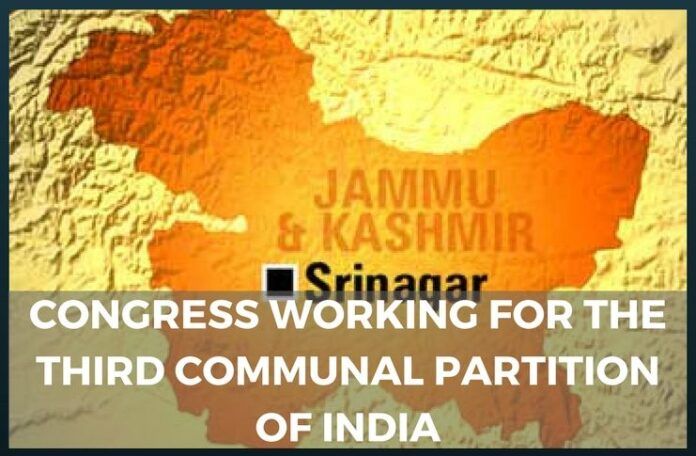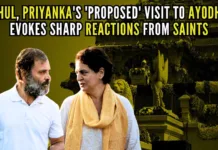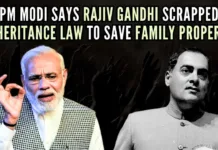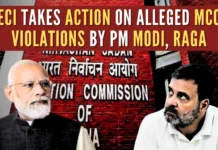
Going beyond Article 370 would mean paving the way for the third communal partition of India
That the Congress has all through betrayed paramount national interest and bungled in Jammu & Kashmir is not a secret. It is also a no secret that it handed over the sensitive border state to a known communalist Sheikh Abdullah in October 1947 and held it aloof from the national mainstream in October 1949 through Article 370. It created the Muslim Republic of Jammu & Kashmir Republic on the territories of India to pander to communalists in Kashmir. More than that, it is also a hard fact that it was the Congress which became instrumental in the second communal partition of India on December 31, 1948.
The Congress’ policy led to the rise of radicalization in the Valley and created widespread discontent, dissatisfaction and disappointment in the state’s two bigger regions, Jammu and Ladakh
Those who say India witnessed only one communal partition are not really right. The first communal division of India took place on August 15, 1947, when the Muslim League carried the day and got out of India a Muslim Pakistan. The second communal partition of India took place on December 31, 1948, when the Congress enforced a strict cease-fire when the Indian Army had the Pakistani intruders on their run and allowed Pakistan to retain control over the Jammu & Kashmir territories, including Gilgit-Baltistan, Muzaffarabad, Mirpur, Kotli, Bhimber, Rawalakot and so on – areas which not only witnessed murder, conversion, kidnapping, rape, loot, plunder and migration of Hindus and Sikhs on an unprecedented scale but which also became 100 per cent Muslim in no time.
What the Congress did to and in Jammu & Kashmir between 1953 and 2014 has been recorded and commented upon by countless observers and commentators, both nationalist and ultra-liberals or those who considered India not a nation but a congregation of almost two dozen nations, with each nation having the right to secede.
There is a general consensus that the Congress and others, who remain at the helm of affairs in New Delhi during this period, didn’t handle Jammu & Kashmir properly. The critics of the Congress held the view that it didn’t integrate Jammu & Kashmir fully into India like other states and that its policy of appeasement or incremental concessions to ardent believers in the concept of Kashmiri Muslim sub-nationalism created the whole mess in the state. The Congress’ policy led to the rise of radicalization in the Valley and created widespread discontent, dissatisfaction and disappointment in the state’s two bigger regions, Jammu and Ladakh, the nationalist observers and commentators consistently opined.
On the other hand, ultra-liberals criticized New Delhi for not accommodating the aspirations of the Kashmiri Muslims by withdrawing the provisions of the Indian Constitution and Central laws and Central institutions from the state. They held New Delhi or the powers-that-be at the Centre responsible for the growing alienation in Kashmir and, this, despite the fact that Kashmir and a particular sect (read Kashmiri Sunni) among the Muslims remained at the helm of affairs between October 1947 and December 2014. The office of the Chief Minister became the sole preserve of Kashmir on day one, with Jammu and Ladakh being considered Kashmir’s two colonies where the life of the people will not be one of the political and economic aspirations but of toil and penury.
Chidambaram has said that the BJP-led Union Government has taken a “maximalist position that has aggravated the problem”
In 2014, the BJP came to power at the Centre and on March 1, 2015, the Kashmir-centric and pro-self-rule People’s Democratic Party (PDP) and the “nationalist” and “pro-Jammu” Bharatiya Janata Party (BJP) formed a coalition government in Jammu & Kashmir. Ever since then, the Congress has been finding fault with the BJP’s Kashmir policy and accusing it day-in-and-day-out of mishandling Kashmir, using excessive powers in the Valley, causing more alienating among the Kashmiri Muslims and not resolving the so-called Kashmir issue by taking on board all stakeholders, including Pakistani-founded, funded, controlled and directed separatists, including Syed Ali Shah Geelani, Mirwaiz Umar Farooq, Yasin Malik, to mention only a few. And, this despite the fact that the policy of the BJP towards Jammu & Kashmir is no different. The PDP-BJP agenda of an alliance is dangerous than the Indira-Sheikh Accord of 1974.
The Congress has not even once said that India is the only stakeholder in Jammu & Kashmir and what has been happening in the Valley is the fallout of the policy of appeasement which it followed for decades to create among the Kashmiri Muslims a feeling that they were a race apart and that they needed to be treated differently through a regime that ends the Indian presence in the Valley and perpetuates the Kashmiri domination and hegemony over Jammu and Ladakh. Jammu and Ladakh constitute over 88 per cent of the state’s land area and house half of the state’s population, if not more. The Hindus, Sikhs and Buddhists are more than 60 lakh but the Congress has nothing to do with them, as it considers the Kashmiri Muslims the only factor in the state.
On the contrary, the Congress high command has fielded its three top leaders to represent its view on Jammu & Kashmir. They include former Home and Finance Minister P Chidambaram, former minister Mani Shankar Aiyar and another former Union Minister Saif-ud-Din Soz, a Kashmiri and Sunni.
The point is that the Congress wants the Narendra Modi-led NDA Government to look beyond Article 370. Jammu & Kashmir already enjoys maximum autonomy
Chidambaram has said that the BJP-led Union Government has taken a “maximalist position that has aggravated the problem”. He has put forth a five-point formula to end the Kashmiri alienation. He has suggested (1) reduction in the number of troops in Kashmir, (2) unilateral ceasefire, (3) appointment of interlocutors, (4) talks with civil society and student leaders and (5) political resolution of the “unique” Kashmir’s “unique” problem. The upshot of his whole formulations is: “Solutions which are applicable to other states cannot be replicated in Jammu & Kashmir, as Kashmir has a unique history, unique geography, and unique problem”.
Mani Shankar Aiyar says almost the same thing and also brings into the picture Pakistan. “The only way to resolve the Kashmir issue is to hold talks with Pakistan and Hurriyat” has been what he has been saying. In Pakistan, he had even suggested that if Pakistan wanted to resolve Kashmir, it had to help the Congress dislodge the Narendra Modi Government.
However, it is Saif-ud-Din Soz who has been explaining away what could end the Kashmir problem. “Kashmiri youth have reason to revolt against India,” he has been saying. He has been urging New Delhi to declare “Jammu & Kashmir a bridge between India and Pakistan”. In other words, he is justifying what has been happening in Kashmir and demanding independent status for Jammu & Kashmir.
The point is that the Congress wants the Narendra Modi-led NDA Government to look beyond Article 370. Jammu & Kashmir already enjoys maximum autonomy. Going beyond Article 370 would mean paving the way for the third communal partition of India. Can India afford another communal partition? It just can’t. The third partition would surely culminate in the balkanization of India. Fissiparous tendencies have already gripped many parts of the country. The enemy is just looking for an appropriate opportunity to strike and break India.
It is time to not go beyond Article 370 but to withdraw it completely. Yes, there would be some trouble in Kashmir for some days. So be it. After all, the Indian nation has been facing troubles in Kashmir since October 1947.
Note:
1. The views expressed here are those of the author and do not necessarily represent or reflect the views of PGurus.
- ‘Kashmir My core constituency’: Revisiting July 12, 2003 to understand politics, Omar Abdullah-style - March 15, 2024
- Total deviation from traditional approach: Seven takeaways from PM Modi’s March 7 Srinagar visit - March 9, 2024
- Status of political parties: Why is further J&K reorganization imperative? - March 1, 2024











Jogendra Nath Mandal, a Bengali Scheduled Caste leader, chose Pakistan over India
He was Pakistan’s first labour and law minister.
On October 8, 1950, Mandal wrote the following anguished 8,013-word letter of resignation to Liaquat Ali Khan, then Pakistan’s prime minister.
He also left Pakistan forever to move to India.
https://biblio.wiki/wiki/Resignation_letter_of_Jogendra_Nath_Mandal
Adhoc decisions about a State could have been reviewed and set aside as per the wills of the Bharat Varsha. Really surprised to get lingered this 370 issue since last 70 yrs without any value to us.
Centre must remove anything and evrything coming on the way to integrate J&K with us. The Kashmiri Pandit and any one who wanted to staty their must be supported . Even we are willing to go there ,buy land start a business and give employment to our brothers and sisters .
Problem is this funda of Islam is suppose to be understood first , then only we help them to prosper. They always talk about shariya,Qran and what not even after seeing results across the whole world.
better late than never.